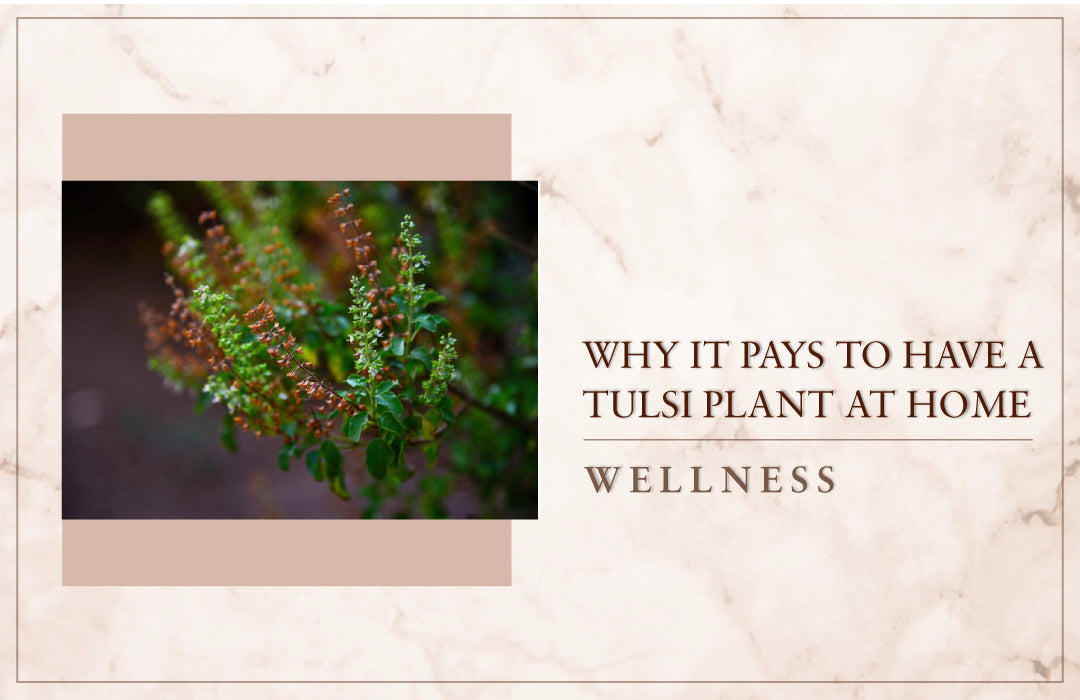Holy basil, or tulsi, meaning ‘the unmatchable one’, is considered sacred in Hinduism and is worshiped as ‘Goddess of Devotion’ in many of the Indian households. The spiritual significance of cultivating tulsi plant is well known, but, here we are going to unveil its beauty and wellness benefits!
For a Healthy Complexion

Did you know that more than thousand samplings of tulsi are planted around Taj Mahal in Agra because of its ability to enrich the surrounding environment with oxygen and to absorb air pollutants? If Taj Mahal’s beauty secret is tulsi then why cannot it be yours? Imagine what wonders it would to your skin.

a) Face Mask
Revered as the elixir of life, tulsi is appreciated as ‘Mother Medicine of Nature’. It helps the skin in staying healthy and supple. Paste of its leaves when applied on the face helps clear marks. Also, Urosolic acid content in its leaves aids in returning the skin its elasticity and removing wrinkles.

b) Tulsi Tea
We will call it ‘liquid yoga’ for the skin because of its calming and detoxifying properties. Tulsi tea is surely a tonic that offers solutions to many modern-day skin problems such as ageing and dullness. Because of its high antioxidant content, it offers substantial protection against free radical-induced damage to the skin.

c) Basil smoothie
Tulsi is a good source of beta-carotene, calcium, vitamin C and unique flavanoids such as orientin and vicenin, which protect against environmental stressors. Whip up some fresh basil leaves, berries of your choice and milk to make this creamy yet sweet recipe.
For Healthy Body

Tulsi is one of the best examples of Ayurveda’s holistic lifestyle approach to health. It is considered as a potent adaptogen, a herb that helps with the adaptation to stress and the promotion of homeostasis. Tulsi promotes wellbeing and resilience.

a) Devine Decoction
Tulsi leaf decoction is a famous remedy for the common cold in India, due to its ability to penetrate the deep tissues, dry tissue secretions and normalize Kapha and Vata. It’s also helpful in calming down the inflammation of stomach and liver.

b) Eye Tonic
Fresh juice of holy basil along with Triphala acts an effective eye tonic and helps cure pink eye and other diseases related with eyes.

c) Antimicrobial
Essential oil present in tulsi has anti-bacterial, antiviral and anti-fungal properties, which can prove itself to be a better option than modern-day antibiotics which ultimately lead to resistance. It is scientifically proven that oils of holy basil help cure diseases such as pneumonia and Urinary Tract Infections.

d) Stress Buster
Studies have shown that the leaves pay significant protection against stress. If taken twice a day, tulsi leaves can have a calming effect on the body and mind. It helps counteract many troublesome effects of chronic stress, including nervousness, sleeplessness, and depression.
For a Healthy Home

It is said that keeping a tulsi plant in your home can invite good luck and prosperity. Well, it won’t be wrong to say that because of its whole lot of medicinal properties enlisted below.

a) Insect repellent
Tulsi is planted in Indian gardens as a mosquito repellent, as its essential oils possess 100 % larvicidal property. Eugenol is the main constituent in it, which is responsible for its repellant property.

b) Heat Reducer
Because of its ability to release oxygen for almost 24 hours, tulsi absorbs most of the heat-trapping gases such as CO2! Isn’t it a mini-cooler at your home?

c) Aromatherapy
Tulsi is an aromatic plant with a sweet and earthy fragrance. It uplifts your mood and also helps reduce mental stress.
Isn’t tulsi the best plant to ornate your windowsill? Feeling like growing one of your own?
Here’s how you can do it
- Put the tulsi seeds on top of the soil
- Tamp them for good soil to seed contact
- Cover the seeds with 1/4 inch layer of compost or soil
- Water the seeds with a sprayer and place them where they receive part morning sun.
- Keep the soil constantly moist until the germination, which will take around 1-2 weeks.
References-
2. https://jprsolutions.info/files/ms-file-5c1deb8b376b31.34064231.pdf
3.https://www.ncbi.nlm.nih.gov/pmc/articles/PMC4868837/
Read More-
1. Natural And Effective Ways To Wash Your Face Without Soap
2. 8 Ayurvedic herbs to look for in face washes and cleansers





